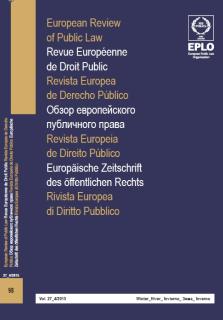
Current Situation and Prospects of Regulatory Impact Assessment (RIA) in Germany, Namely in Parliament
Prof. Dr. jur., University of Hamburg Law School, International Association of Legislation
Regulatory Impact Assessment (RIA) is one of the first and most effective instruments to reduce costs of legislation. RIA procedures are applied in the EU organs and in all its Member States. The first step was the reduction of administrative burdens. Nowadays one tries to evaluate all compliance costs for citizens, business and the administration with a view to reducing them. In the European Commission there has been established the “High Level Group of Independent Stakeholders on Administrative Burdens” (“Stoiber Group”). This paper focuses on RIA in Germany, namely in Parliament. It describes the work of the independent “National Regulatory Control Council”, which assesses every draft as concerns compliance costs. Furthermore, it looks into RIA mechanisms in the two houses of Parliament, namely the Federal Diet (Bundestag) and the Federal Council, which is the “House of States” (Bundesrat).
L’évaluation de l’impact réglementaire (EIR) est l’un des premiers instruments et parmi les plus efficaces pour réduire les coûts de la législation. Les procédures d’EIR sont mises en œuvre dans les organes de l’UE et dans tous ses Etats membres. La première étape a été la réduction des charges administratives. On essaie aujourd’hui d’évaluer tous les coûts de mise en conformité pour les citoyens, les entreprises et l’administration, dans l’intention de les réduire. Au sein de la Commission européenne a été créé le “Groupe de haut niveau de parties prenantes indépendantes sur les charges administratives” (le “groupe Stoiber”). Cet article se penche sur les EIR en Allemagne, notamment au parlement. Il décrit le travail du “Conseil de contrôle réglementaire national”, institution indépendante qui évalue tous les projets au vu des coûts de mise en conformité. En outre, l’article examine les mécanismes d’EIR dans les deux chambres du parlement, à savoir la diète fédérale, le Bundestag, et le conseil fédéral, le Bundesrat, qui est la “chambre des Etats”.





















